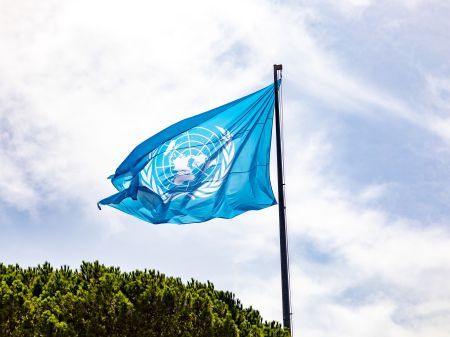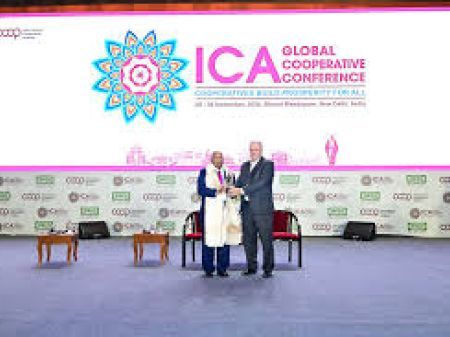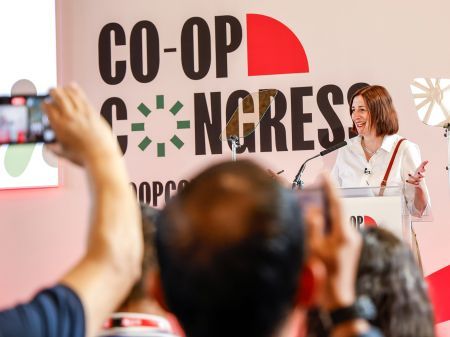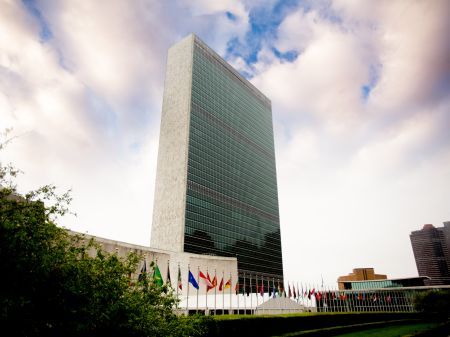
Women Engage for a Common Future (WECF International) works in policy advocacy and provides practical support for gender-just and sustainable cooperatives in 70 countries. We speak with its Executive Director, Sascha Gabizon, about how she sees the cooperative model benefiting women in different sectors, improving rights and access to finance, and ultimately supporting and accelerating SDG5.
ICA: You're the executive director of Women Engage for a Common Future. Can you tell us about the work you do?
Sascha Gabizon: We are an international eco feminist network. We have partners who are feminist organisations, who work on environment and climate and together in 70 countries. We know the ICA very well, because we work in similar policy spaces for sustainable development and gender justice. We do a lot of policy advocacy and analysis, and we use the sustainable development goals as our guideline and the ambition for what we should be achieving. But we also do a lot of practical work. We help support local organisations to create alternatives which are gender-just and sustainable, and that can include the creation of cooperatives. We have offices also in several countries in Europe, from which we support the network worldwide. We have an office in the Netherlands, which is our oldest office (we just turned 30), as well as Germany, France and Georgia.
ICA: How do you see cooperatives being active in the way that you complete your work, and how do you see the partnership with the ICA helping with that?
SG: We all see there is a real problem with business as usual and believe that the more socially just model, such as the cooperative model, is much more sustainable, inclusive and efficient, because you don't have to pay very high profits to shareholders, and it's more democratic. And I think that's probably the most important thing, because, as we now see, having governments which are very much influenced by high value rich billionaires is, of course, not very democratic. It's a much better model to have a cooperative where you become a member, where all together, you invest in developing sustainable businesses. That's why we very much have always supported cooperatives, and also like to promote the cooperative model amongst our partners.
For example, we work a lot with women who are part of agricultural cooperatives (both women-only and mixed co-ops), and women working on renewable energy cooperatives as a model for the energy transition. We see that the threshold to become active in a social economy is much lower when you use a cooperative model, and for women who often have less access to finance and capital. It's an easier step to take for a woman to become a member of a cooperative than to become a shareholder in a big company. It's a model which has proven itself extremely important, but I think we are still missing political support [and] we really need to fight to make sure that the cooperative model is seen as probably the best alternative for sustainable development worldwide.
ICA: Can you share examples of cooperatives you have worked with that really made a difference to the women involved and their communities?
SG: Of course. We're working with the Rural Women's Organizations in Uganda which supports women in agriculture. Their main challenge is women's rights and land control, and finding solutions for cases where, even after inheriting land, it may be taken away by male family members, uncles or cousins. Ensuring the control and rights over land for an individual farmer woman is often more complicated than if you organise as a cooperative; in a cooperative you have more support and security, and also control over the income and investments. Many farmer women in Uganda did not have any savings or didn't have a bank account – now it's getting easier because we have Safaricom and other digital online banking services, which will allow you, maybe, to save up to $1,000 or so. But even that is a limited way of women accessing investment funding. Through cooperatives, you can organise getting access to banks and loans, and actually, the basis of many agriculture cooperatives has been the saving and loans aspect, because that was the biggest challenge for the women farmers. We have added training and some investments in renewable energy, like solar PV panels for free access to electricity, which has also given a big boost, because then there is also access to the internet and market information. We invested maybe $8,000 in total in the solar panels, and that is enough to run the office of the cooperative, and also enough for all women in the community to come and charge their phones and to have access to the internet. We've also been working with them on how to reduce purchases of toxic pesticides, which are a cost financially, but also a cost to people's health.
ICA: How do you see the cooperative model accelerating the Sustainable Development Goals - not just SDG5, but all of them as a cohesive ecosystem?
SG: You have cooperatives in many different sectors. The SDGs look at energy, at sustainable consumption and production, at agriculture and ending hunger. They look at water and sanitation, and at decent jobs and economic development. In all these areas, the cooperative model can lead and can help accelerate achieving them.
We see that there is a backlash happening because of far right governments who are in power in a number of countries, including my own, in the Netherlands, where funds are being cut for civil society, for developing cooperation, and where the government is saying that the only solution is business. And then again, ‘Yes, but you also have a social, responsible business, and you have the cooperative model, and that can help us achieve these sustainable development goals’.
I feel that [for SDG5] we still see in some countries the need for more equality in the number of women who are members of cooperatives, especially in more technical areas like renewable energy, and also women in leadership positions, in the management or in the board. We see a lot of work already happening in this area – I have colleagues who are working with the European renewable energy cooperatives addressing these issues, and of course, you need to work also together with the municipalities, and with the governments, because a lot of this starts at school and in the education system.
ICA: 8 March was International Women's Day and in 2025 the theme was ‘Accelerate Action’. What does that mean to you?
SG: At the moment we see that we are still 150 years or more away from gender equality if we continue as we are, so we have to take actions which will accelerate gender equality in all areas of our societies, including in the economic sector. We see that we are backsliding with less women in government, so we have to make an extra effort to not only stop the backlash, but also to really make an accelerated progress towards gender equality in these areas. We know that there are many instruments and tools which can help us do that, not only through education and training, but also in terms of how you organise your cooperative, for example. Do you want to have a gender equal cooperative? Do you want to set it as a target? Do you want to have co-leadership of women and men and gender diverse persons in your boards or in your management teams? Then there’s how you approach potential clients, or work with upstream and downstream partners. Can you make a difference there as well? Can you maybe try to specifically have a strategy on how to engage more women downstream or upstream in your value chain, for example? So there's a lot we can do, and a lot which is already being done. But we can scale these more.
ICA: You were involved in the fourth World Women's Conference in Beijing in 1995. This year is the 30th anniversary of the Beijing Declaration and the platform for action to promote gender equality and women's empowerment. What progress have you seen?
SG: These times are not easy, but of course, there's been huge progress. And a lot of it has happened through improved policies, and there we have worked together with the cooperative movement and other civil society groups as well as trade union groups, etc. I think the biggest changes we've seen are in partner countries such as Kenya, where they have created gender equality as one of the key principles of the constitution. Or in France, where the right to safe and legal interruption of pregnancy is also now part of the constitution. These are then steps which are much more difficult to roll back, because once it's in your constitution, it's much more powerful. We have also seen a lot of great work being done on land rights for women farmers, and around the regulation and the legalisation of cooperative models and civil society models, which 30 years ago did not exist in all countries.
And these are thanks really, to this process which started 30 years ago in Beijing, where, for the first time, all member states of the UN agreed to this really ambitious agenda.
But we do see in some countries a huge shift backwards where, for example, civil society is being forbidden. Like in Georgia, where we have an office, the pro-Russian government has taken steps which mean you have to close civil society organisations.
You can have economic progress for women, like having access to bank accounts and land rights, but if you're not also addressing underlying barriers and stereotypes or discrimination, then you won't come very far, and it won't be very sustainable. So that's why we also really need to push for women's sexual and reproductive rights and bodily autonomy, to be able to plan your family size, to have access to contraceptives, to stop underage marriage of girls. You have to take these steps in parallel: if not, it won't be sustainable.
So I think we have seen, luckily, a lot of progress in many countries in the world, and although a few are turning backwards, we will stand up and resist.
ICA: In your view, what are the most pressing needs to be addressed, and how can cooperatives help?
SG: I think structural barriers are often not visible, and so even in cooperatives, it is really useful to do a gender equality organizational analysis and see what our practices are. Are there any underlying structural barriers we are not aware of? For example, I visited some flower cooperatives in Kenya, and they had made a huge change by introducing a gender equality committee in the cooperative with a mechanism for complaint and immediate measures in case of sexual and gender-based violence. By making these steps and creating the gender committee and having women in management positions, they created a huge change in their organisation.
Sexual and gender-based violence in the workplace is such a taboo, and we saw with the Me Too movement how this is happening everywhere, in Europe, in the US, in universities and businesses, in government, and you have to make it a topic to discuss [so] you can make a positive change that is good for your cooperative.
ICA: The theme for the 2025 International Year of Cooperatives is ‘Cooperatives Build a Better World’. In your experience, how do you see cooperatives working towards this?
SG: You have cooperatives in all sizes and forms, and not all of them have been focused on sustainable development. For example, I come from a country where you have very big dairy cooperatives or banking cooperatives who at the core have not always been very environmentally friendly or climate-friendly, or environmentally sustainable. But I think the cooperative movement has been doing a lot more than mainstream business. There are a lot of really good practices and case studies, and I think that’s an important part of your work at the ICA that you share what has been done so others can learn from it and do things better. There's great work being done, but more which can still be done.




